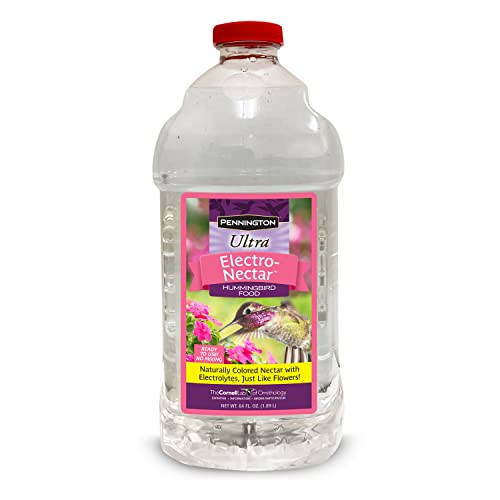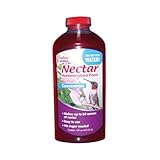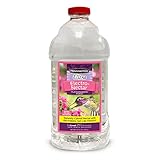
The magic of nature lies not just in its captivating beauty, but also in the intricate relationships and delicate balance that exist within its realms. A prime example of this awe-inspiring connection can be found in the enchanting world of hummingbirds and the sustenance they seek from flower nectar. However, have you ever pondered the longevity of that all-important hummingbird food once it rests within the cool confines of your refrigerator?
It is a question that piques the curiosity of the nature enthusiast and hummingbird connoisseur alike– how does time influence the viability and freshness of this concoction that sustains these vibrant creatures? This exploration delves into the intricacies of storing the essence of their existence, offering insights into the shelf life of this liquid elixir that fuels their high-energy lifestyles.
One might assume that the preservation of hummingbird food within the refrigerated sanctuary would indefinitely prolong its lifespan, maintaining the nutrients essential for their survival. While this assumption holds some merit, it also opens a Pandora’s box of queries regarding the optimal conditions, maximum duration, and potential impacts this storage method may have on the nutritional value of the nectar.
Preservation guidelines for homemade nectar for hummingbirds
Ensuring the safety and freshness of homemade hummingbird nectar is crucial for attracting and nourishing hummingbirds. Understanding how long it is safe to store hummingbird food in the refrigerator is essential in maintaining its quality and preventing any potential health risks for these beautiful creatures.
Optimal refrigeration duration
While it is recommended to prepare fresh hummingbird food regularly, there are instances when refrigeration becomes necessary. The longevity of stored homemade nectar can vary, depending on various factors such as ingredients, storage conditions, and potential bacterial growth.
When refrigerating hummingbird food, it is important to consider the sugar and water mixture’s overall quality and how it might affect the well-being of hummingbirds. To ensure the safety of the food, it is advised to store the nectar in a clean, airtight container and place it in the refrigerator.
Factors influencing preservation duration
Several factors can influence how long hummingbird food remains safe to use after refrigeration. These factors include the sugar concentration, water quality, storage temperature, and the presence of any spoilage signs. It is crucial to stay aware of these factors to ensure the nectar’s freshness and safety for hummingbirds.
The sugar concentration in the nectar affects its preservation. A higher sugar concentration – usually a 4:1 ratio of water to sugar – helps extend the nectar’s storage life by inhibiting bacterial growth. However, it is important to strike a balance, as too high a concentration might harm hummingbirds due to excessive sugar consumption.
The quality of the water used in the nectar mixture also plays a role in preservation. Using filtered or distilled water is recommended to prevent any potential contaminants that could impact the preservation duration. Additionally, refraining from using artificial sweeteners or honey is essential as they can lead to fermentation or bacterial growth.
The storage temperature within the refrigerator should be cool and consistent. Hummingbird food stored at a temperature below 40°F (4°C) is likely to have an extended shelf life compared to nectar stored at higher temperatures due to slowed bacterial growth and enzymatic activity.
Regularly inspecting the hummingbird food for any spoilage signs, such as discoloration, cloudiness, or an off aroma, is crucial. If any such signs are visible, it is recommended to discard the nectar immediately and prepare a fresh batch.
In conclusion, keeping homemade hummingbird food in the refrigerator can help extend its shelf life. Adhering to optimal refrigeration duration, considering influencing factors, and regularly monitoring for any spoilage signs can ensure the freshness and safety of the nectar, creating an ideal environment to attract and nourish hummingbirds.
Understanding the Shelf Life and Potential Risks of Refrigerated Hummingbird Nectar
In this section, we will delve into the fascinating topic of how to properly manage the lifespan of refrigerated hummingbird nectar and the associated risks that may arise. Exploring the longevity of this essential food source for hummingbirds and understanding the potential hazards can help ensure the well-being of these delicate creatures.
Shelf Life of Hummingbird Nectar:
Hummingbird nectar, a vital energy source for these tiny birds, can remain fresh for a significant period when properly stored in a refrigerator. However, it is crucial to comprehend the factors that affect its shelf life. The quality of the ingredients and the storage conditions play key roles in determining how long hummingbird nectar can maintain its nutritional value and appeal to these remarkable creatures.
When it comes to preserving the freshness of hummingbird nectar, ensuring the usage of high-quality ingredients is paramount. Opting for refined white sugar, which dissolves easily in water without leaving any residue or impurities, is highly recommended. This not only helps maintain the nectar’s flavor and nutrition but also prevents the formation of harmful bacteria and molds that can cause potential health risks to hummingbirds.
Potential Risks of Refrigerated Hummingbird Nectar:
While refrigeration significantly extends the shelf life of hummingbird nectar, it is important to be aware of certain risks associated with its prolonged storage. The prime concern is the growth of harmful microorganisms, such as yeast, bacteria, and molds, which can compromise the quality and safety of the nectar.
Refrigeration can slow down the growth of these microorganisms, but it does not eliminate them entirely. Over time, if the nectar is not properly sealed or stored for an extended duration, these organisms can multiply, leading to fermentation or spoilage. This can result in the formation of toxins harmful to hummingbirds if consumed.
Another risk to be mindful of is the degradation of nutritional value. While refrigeration can help retain the freshness of hummingbird nectar, prolonged storage can cause a gradual loss of certain nutrients, potentially impacting the overall health and well-being of the birds.
In conclusion, understanding the shelf life of refrigerated hummingbird nectar and the potential risks associated with its storage is crucial in maintaining a suitable food source for these enchanting creatures. By prioritizing the usage of high-quality ingredients and proper storage techniques, we can ensure that the nectar remains safe, fresh, and nutritionally rich for our delicate hummingbird friends.
Preserving hummingbird food: Essential tips for refrigeration
When it comes to preserving the nectar for our colorful feathered friends, refrigeration is an important aspect to consider. Properly storing hummingbird food can ensure its freshness and maximize its shelf life. In this section, we will explore the key points you need to know about refrigerating hummingbird food, including recommended storage duration, optimal temperature, and potential risks to be aware of.
1. Storing duration
While your intention might be to keep hummingbird food in the refrigerator for an extended period, it is essential to consider its freshness and nutritive value. To maintain the quality of the nectar, it is recommended to store it in the refrigerator for no more than a week. Beyond this duration, the sugar content may start to break down, leading to a less nutritious and less appealing food source for hummingbirds.
2. Optimal temperature
The suitable temperature range for refrigerating hummingbird food lies between 35°F (1.7°C) and 40°F (4.4°C). This temperature range helps slow down the oxidation process and minimizes the growth of bacteria and fungi. It is crucial to ensure your refrigerator is set to the appropriate temperature to maintain the integrity of the nectar.
3. Risks to be aware of
While refrigeration is generally a reliable method for preserving hummingbird food, there are a few risks to be aware of. One risk is the possibility of contamination, especially if the nectar is not stored in an airtight container. It is necessary to use clean, tightly sealed containers to avoid any contact with airborne bacteria or other contaminants. Additionally, prolonged storage in the refrigerator can result in a lower sugar concentration, potentially impacting the energy source for hummingbirds.
By following these tips, you can successfully preserve hummingbird food in the refrigerator, ensuring its freshness and nutritional value for our feathered friends. Remember to regularly check the storage duration and maintain the optimal temperature to provide the best possible nectar for these delightful creatures.
Exploring the Advantages and Limitations of Refrigerating Hummingbird Nectar
In this section, we will delve into the various benefits and constraints associated with storing hummingbird nectar in the refrigerator. By understanding these factors, you can make an informed decision on whether refrigeration is a suitable method for preserving hummingbird nectar.
The Advantages of Refrigeration for Hummingbird Nectar
-
Prolonged Freshness: Refrigerating hummingbird nectar helps to preserve its freshness for an extended period. The cooler temperature slows down the growth of bacteria and yeast, minimizing the chances of spoilage.
-
Reduced Fermentation: Fermentation can occur when nectar is left at room temperature for too long, leading to the growth of harmful molds and bacteria. Refrigeration inhibits this fermentation process, ensuring the nectar remains safe for the hummingbirds.
-
Enhanced Nutritional Value: Refrigeration can help retain the essential nutrients present in the nectar, making it a healthier food source for the hummingbirds. By preserving the nutritional integrity, you contribute to the overall well-being of these fascinating creatures.
The Limitations of Refrigerating Hummingbird Nectar
-
Temperature Sensitivity: Although refrigeration is generally effective in preserving freshness, extreme temperatures can alter the consistency and texture of the nectar. Freezing, for example, can cause crystallization and separation, affecting its quality.
-
Storage Space Requirements: Refrigerating hummingbird nectar requires adequate storage space in your refrigerator. This can be a limitation if you have limited space or frequently store other perishable items.
-
Extended Chilling Time: It is important to note that refrigerated nectar may turn cold, and hummingbirds might find it less appealing to consume. Allowing it to reach room temperature before serving can help maintain the optimal feeding experience for these small birds.
By understanding the advantages and limitations of refrigerating hummingbird nectar, you can actively decide whether this storage method aligns with your needs and the well-being of these delightful creatures.









